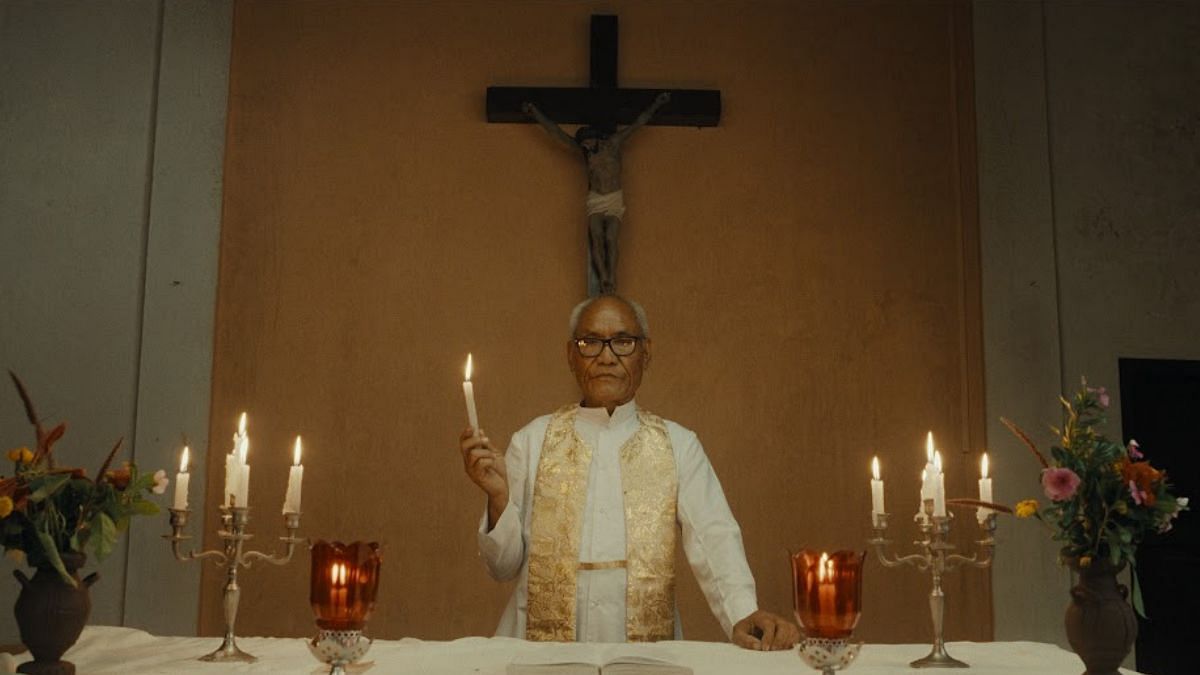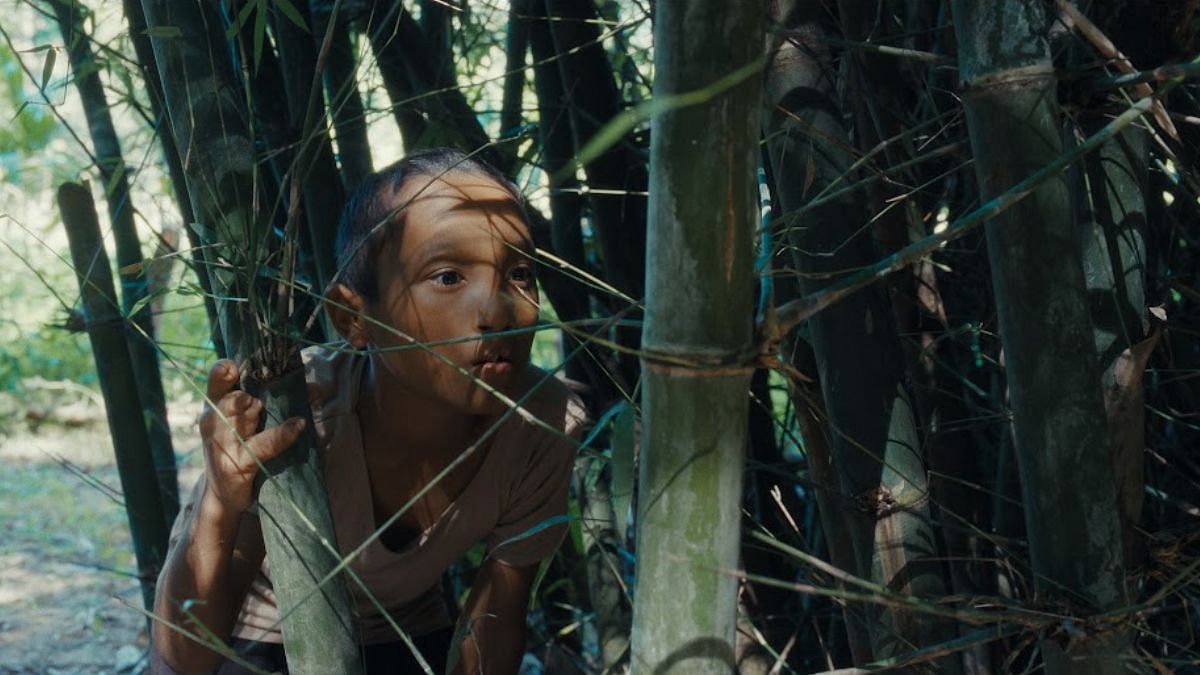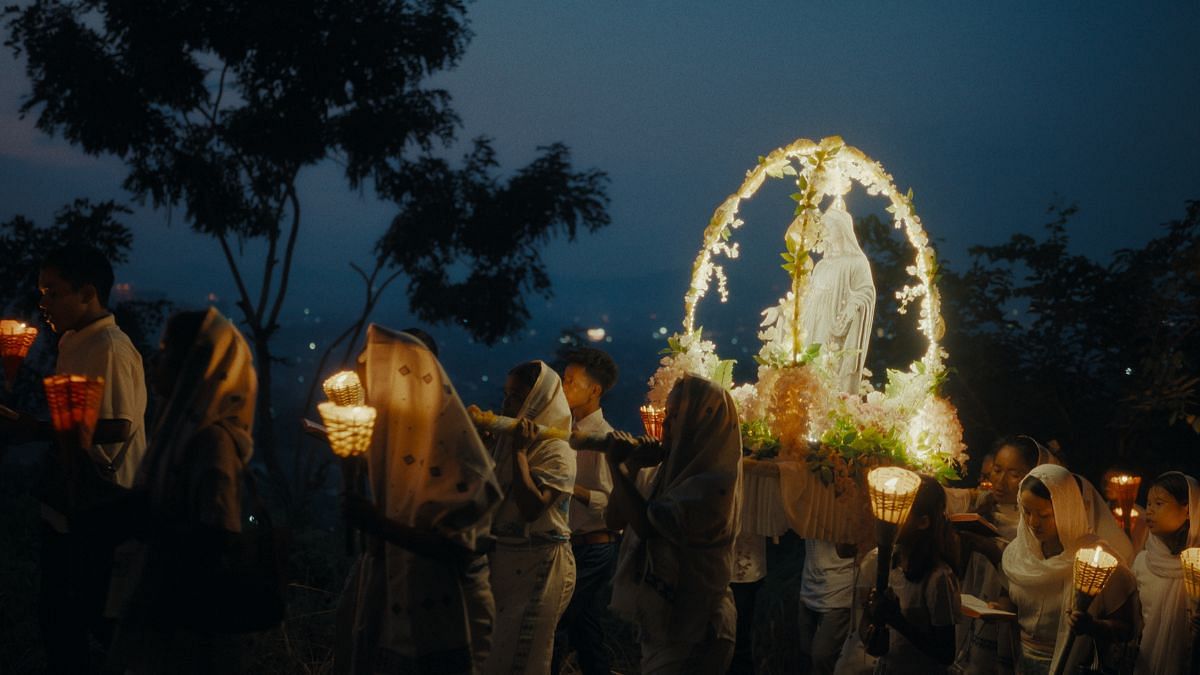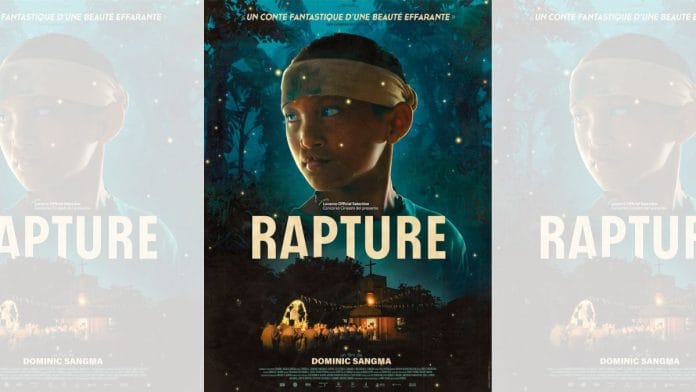Meghalaya is known for its beauty, biodiversity, year-long rain and music festivals. What it is not known for is filmmaking. But one man is changing that in a state with only two movie theatres.
Dominic Sangma’s second Garo-language film Rimdogittanga or Rapture (2023) was released across 33 French cities and 36 theatres in May. Filled with biblical references, including the title, the 127-minute film is the story of a close-knit community, both weighed down and united by its fear of outsiders.
Sangma zooms in on the traditional tribal way of living, and how it often stands in opposition to what Christian missionaries believe in. The result is a constant push and pull of faith. The villagers place their faith both in the pastor and the village shaman but don’t find respite anywhere.
His previous film, Ma. Ama (2018) won the National Film Award for Best Feature Film in Garo at India’s 66th National Film Awards. The two are part of a trilogy.
Rapture follows a ten-year-old boy Kasan (Torikhu A Sangma)—from the fictional village of Zilla Niongittim in Garo Hills—who suffers from night blindness. It’s a picture-perfect village, but there are undercurrents of tension from the very start.
Children bully each other. Outsiders are othered. The local pastor predicts an 80-day apocalyptic darkness, for which he starts a ‘fund’. There are rumours of human trafficking for organs. Villagers are disappearing giving credence to the pastor’s doomsday predictions. One of them is 19-year-old Mangkungchi, who disappears while harvesting cicadas at night. The strange happenings grow more grotesque by the minute, eventually culminating in a murder, and Kasan is the sole witness to it.
The pastor (Celestine K Sangma) is fuelled by his personal agendas, whether it’s using his authority to initiate an affair with a villager, Kimkiwe (Balsrame A Sangma), or wielding his knowledge of the Bible to manipulate villagers into donating money for an ‘Apocalyptic Relief Fund’.

The shaman on the other hand doesn’t have much screen space, which is another indicator of how deeply Christianity has penetrated the village. In one scene, a villager alleges that the shaman is looting them and not providing real solutions.
Just like with Ma.Ama, Sangma draws from his own memories to build the narrative spine of Rapture.
“My previous film Ma.Ama explored my memories and family experiences growing up, and Rapture is about the wider society in the village. I grew up experiencing this deep fear of outsiders. There was always the fear and suspicion that anyone who came from outside could kidnap you because this was happening all the time,” Sangma had said to Deadline.
Language politics
Sangma grew up in Nongthymmai in Ri Bhoi district of Meghalaya and draws from his own experiences. The incidents in Rapture are neither isolated nor exclusive to any particular village or community. They are not rooted in the past.
In 2018, two men in their 30s were lynched in Assam’s Karbi Anglong district by villagers on suspicions of being child kidnappers. On their way to a village with scenic waterfalls, the duo were apprehended by a mob and beaten to death.
Sangma explores language and its politics in the film as well.
“The child [Kasan] has a cleft lip, and not everyone understands his words. His father is unable to articulate himself. The pastor uses language to impress the villagers,” Sangma told ThePrint.

There is a sense of untranslatability of experience, whether it’s between Kasan’s father Nengsal (Handam R Marak) and the rest of the village, the villagers and the police, or between the two belief systems that people follow. That is the tragedy of the community.
The only man who does not talk at all is Sobel (Johan Ch. Sangma), the village coffin maker, who is almost like an oracle.
“Through Sobel, I wanted to show the importance of taking a pause, as opposed to the constant frenzy of action,” said Sangma.
Sobel’s workshop is never locked, and anyone can come in. It symbolises the importance of allowing people and experiences in, and not being in constant fear of the ‘other’.
Also read: Blackface, shells, ‘jhinga lala hu’—in Indian films, tribal characters are still ‘foot soldiers’
A steadfast vision
Sangma’s vision resonated with Chinese producer and filmmaker Xu Jianshang. In fact, she’s been credited as the primary producer for both of his feature films.
The two met at the Beijing Film Academy in 2014 and found that they had friends in common. One of Xu Jianshang’s classmates was Sangma’s cinematographer in his first movie.
“When I wrote the script for Ma. Ama, I sent it across to her, and she wanted to help produce it. She also helped produce Rapture. I also have producers from Switzerland and the Netherlands,” said Sangma.

The film is backed by a host of individuals and platforms that support filmmakers— the Hubert Bals Fund and Visions Sud Est, Doha Film Institute, Indian producers such as Anu Rangachar, Harsh Agarwal, Aditya Grover and Stephen Zacharias, and Meghalaya-based Eva Gunme R. Marak, who is a patron of Northeast Indian arts.
It could have easily been a case of too many cooks, but Sangma’s vision never wavered.
Rapture was screened at the Busan International Film Festival and in the South Asia Competition of Mumbai Film Festival, where it won the NETPAC Award. It also won the Cultural Diversity Award at this year’s Asia Pacific Screen Awards.
Ma.Ama, too, was a festival darling. It was the only Indian title to be selected for the international competition section at the Mumbai Film Festival. It is a deeply personal movie on longing. And Sangma tells it through his own story of losing his mother when he was a toddler. Recurrent themes of indigenous faith, black magic rituals and Christianity stitch the story together. Nagma’s father played the lead in the film.
In Rapture, too, all the actors were people from Sangma’s village or Tura. Equipment had to be brought in all the way from Guwahati in Assam.
Sangma however does not want to be known simply as a filmmaker who represents indigenous culture.
“I want to be seen as an auteur filmmaker, and create a filmmaking style that is unique and recognisably mine,” he said.
(Edited by Theres Sudeep)






